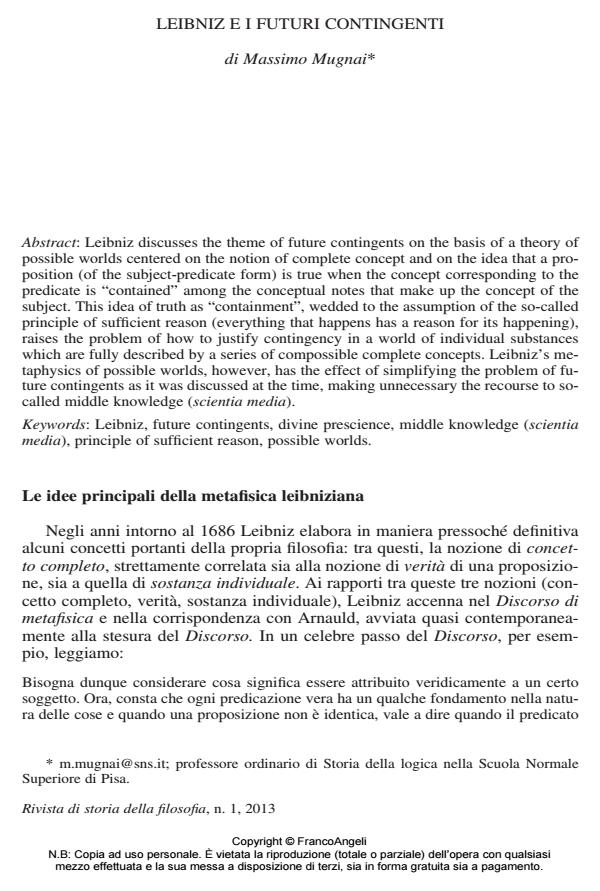Leibniz e i futuri contingenti
Journal title RIVISTA DI STORIA DELLA FILOSOFIA
Author/s Massimo Mugnai
Publishing Year 2013 Issue 2013/1 Language Italian
Pages 20 P. 191-210 File size 497 KB
DOI 10.3280/SF2013-001010
DOI is like a bar code for intellectual property: to have more infomation
click here
Below, you can see the article first page
If you want to buy this article in PDF format, you can do it, following the instructions to buy download credits

FrancoAngeli is member of Publishers International Linking Association, Inc (PILA), a not-for-profit association which run the CrossRef service enabling links to and from online scholarly content.
Leibniz discusses the theme of future contingents on the basis of a theory of possible worlds centered on the notion of complete concept and on the idea that a proposition (of the subject-predicate form) is true when the concept corresponding to the predicate is "contained" among the conceptual notes that make up the concept of the subject. This idea of truth as "containment", wedded to the assumption of the so-called principle of sufficient reason (everything that happens has a reason for its happening), raises the problem of how to justify contingency in a world of individual substances which are fully described by a series of compossible complete concepts. Leibniz’s metaphysics of possible worlds, however, has the effect of simplifying the problem of future contingents as it was discussed at the time, making unnecessary the recourse to socalled middle knowledge (scientia media).
Keywords: Leibniz, future contingents, divine prescience, middle knowledge (scientia media), principle of sufficient reason, possible worlds
- Bobro e Clatterbaugh 1996: Mark Bobro e Kenneth Clatterbaugh, Unpacking the Monad. Leibniz’s Theory of Causality, «The Monist», 79 (1996), vol. III, pp. 408-25.
- Bolzano 1929: Bernard Bolzano, Wissenschaftslehre, Meiner Verlag, Leipzig 1929
- Couturat 1903: Louis Couturat (éd.), Opuscules et fragments inédits de Leibniz, Félix Alcan, Paris 1903
- Leibniz 1875-90: Carl Immanuel Gerhardt (Hrsg.), Gottfried Wilhelm Leibniz, Die Philosophischen Schriften, voll. 1-7, Weidemann, Berlin 1875-90
- Leibniz 1923: Gottfried Wilhelm Leibniz, Saemtliche Schriften und Briefe, Akademie Verlag, Berlin 1923 e sgg
- Leibniz 1948: Gaston Grua (éd.), Gottfried Wilhelm Leibniz, Textes inédits, voll. I e II, Presses Universitaires de France, Paris 1948
- Leibniz 2000: Massimo Mugnai ed Enrico Pasini (a cura di), Gottfried Wilhelm Leibniz, Scritti filosofici, voll. I-III, Utet, Torino 2000.
- Leibniz 2008: Massimo Mugnai (a cura di) Gottfried Wilhelm Leibniz, Ricerche generali sull’analisi delle nozioni e delle verità e altri saggi di logica, Edizioni della Normale, Pisa 2008
- Mates 1986: Benson Mates, The Philosophy of Leibniz: Metaphysics and Language, Oxford University Press, New York-Oxford 1986
- Molina 1588-1589: Luis de Molina, Concordia liberi arbitrii cum gratiæ donis, divina præscientia, providentia, prædestinatione et reprobatione, Lisbona 1588; Appendix ad Concordiam, continens responsiones ad tres objectiones et satisfactiones ad 17 animadversiones, Lisbona 1589
- Piro 2009: Francesco Piro, Lo scolastico che faceva un partito a sé (faisait band à part). Leibniz su Durando di San Porziano e i futuri contingenti, in «Medioevo. Rivista di storia della filosofia medievale», XXXIV (2009), pp. 507-43
- Russell 1900: Bertrand Russell, A Critical Exposition of the Philosophy of Leibniz, Routledge, London 1900
Massimo Mugnai, Leibniz e i futuri contingenti in "RIVISTA DI STORIA DELLA FILOSOFIA" 1/2013, pp 191-210, DOI: 10.3280/SF2013-001010